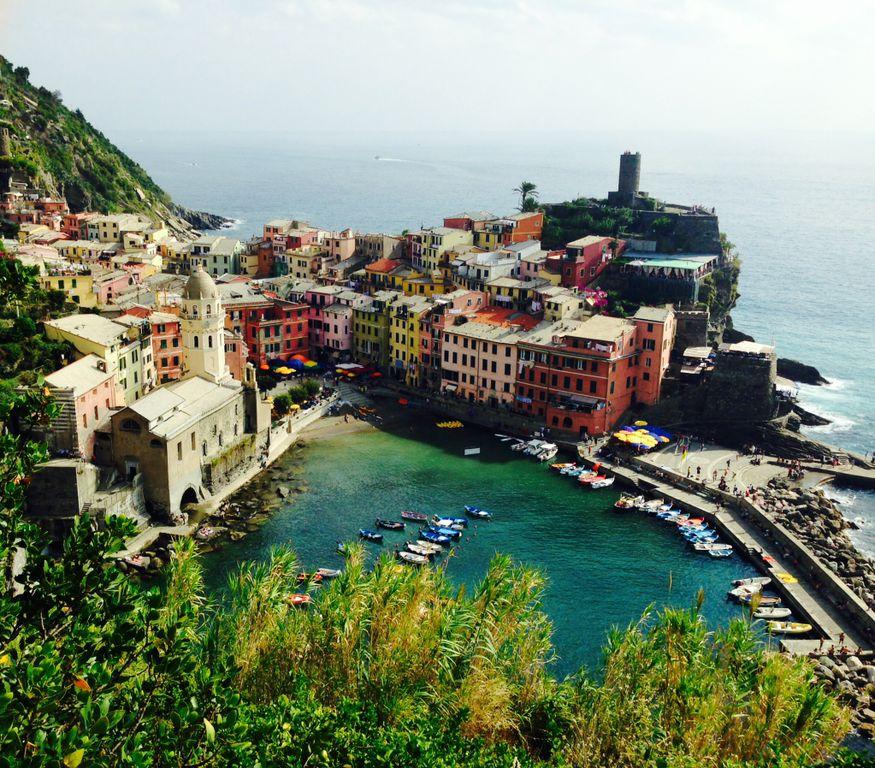MY ITALIAN INITIATION —
This past weekend, I self-determined that I passed the Italian initiation test: I survived a train strike. It happened on our return trip from Cinque Terre, the collective name for the five towns located amidst the cliffs and beaches on the Italian coast.
We travelled here for the weekend, looking to get away from Rome and all that comes with living in a city. It wasn’t until we arrived at La Spezia, the regional train station that connects with the local Cinque Terre line, that we saw the notices warning travelers that there would be a train strike until Sunday at 9 p.m. Our train was scheduled to leave at 4 p.m. the next day. We were all so excited to be in Cinque Terre that we ignored any creeping worries and set out for Riomaggiore, the fifth town of Cinque Terre.
We hiked the 11-kilometer trail that connects the five trails in about five hours, climbed about 900 steps (I lost count), and floated in the Mediterranean Sea as the sun was setting. The day was beyond-words perfect and worth every bit of the bad-train-luck we didn’t know was coming.
Unlike America, where laws regarding firing and workers’ “right to strike” help prevent frequent union action, Italian public service personnel use strikes as a means to get something from the government. They happen so frequently, though, that what they actually want is sometimes unclear – after Googling for 30 minutes, I still cannot find what they were actually fighting for this past weekend. And, in order to make these strikes as inconvenient as possible, the unions do not announce which trains will actually be cancelled. Some will run, some won’t. If you need to get somewhere, or (like us) bought your ticket in advance, you cannot completely rule out your original plan.
In Italy, train strikes happen, plans change and the people survive. So our rigid schedule for the day was forgone, and we somehow found ourselves on ferry to a nearby city, Portovenera. We rode along the steep cliffs and turned a corner to find ourselves at the foot of an ancient castle. Turns out, Portovenera is home to a fifth century church, a twelfth century castle, a grotto where the poet Lord Byron meditated and some of the best seafood I’ve ever eaten. After realizing that maybe this plan was better than its predecessor, I started thanking the system for leading us to such a historic city.
We somehow found a bus that brought us almost directly back to the main train station, with plenty of time to spare before our 4 p.m. departure. But it doesn’t end there. Our train was delayed until 5 p.m., until 6:30 p.m., until 7 p.m., then 7:30 p.m., and finally pushed back until 9 p.m. Even the Italian people were angry; we saw three women actually crying. We were scheduled to arrive in Rome at 6 p.m. and didn’t actually arrive until well past 1 a.m.
However, we did arrive. By boat, by bus, by foot and by train, we found our way back to Rome in one (albeit delirious) piece.
Some positives: the train personnel handed out “goodie” bags, we met a couple from New York who shared their American candy supply with us, and we successfully and independently navigated ourselves through three foreign towns in Italy.
And, writing this the next morning, I still think that it was worth the turmoil. The whole experience fits perfectly into the Italian mindset of generality: do not concern yourself with minor details, like time or plans – everything will be okay. However, I definitely think that the Italian government should rethink its approach to union laws.






























